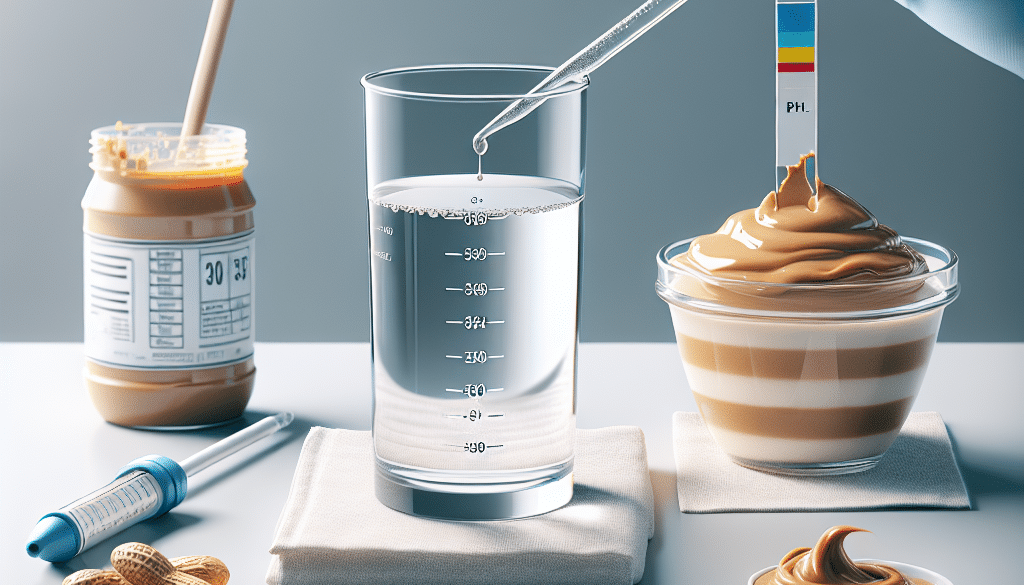PH Level Peanut Butter: Testing the Nutty Waters
-
Table of Contents
- PH Level Peanut Butter: Unveiling the Nutty Secrets
- Understanding pH Levels in Food
- The pH Spectrum of Peanut Butter
- Testing the pH of Peanut Butter
- Health Implications of Peanut Butter’s pH
- Shelf Life and Preservation
- Case Studies and Statistics
- Impact on the Food Industry
- Conclusion: The Importance of pH Balance in Peanut Butter
- Discover ETprotein’s High-Quality Protein Products
PH Level Peanut Butter: Unveiling the Nutty Secrets

Peanut butter is a staple in many households, loved for its creamy texture and rich, nutty flavor. It’s a versatile food, easily spread on toast, blended into smoothies, or used as a base for sauces and desserts. However, beyond its taste and culinary uses, the pH level of peanut butter is a topic of interest for both health enthusiasts and food scientists. Understanding the pH level can provide insights into the product’s shelf life, potential health benefits, and suitability for certain diets. In this article, we will dive into the science behind peanut butter’s pH level, exploring what it means for consumers and manufacturers alike.
Understanding pH Levels in Food
The pH scale measures how acidic or basic a substance is, ranging from 0 to 14. A pH of 7 is considered neutral, below 7 acidic, and above 7 basic (or alkaline). The pH level of food can affect its flavor, texture, preservation, and how it interacts with our body. For instance, acidic foods can stimulate salivation and aid digestion, while alkaline foods may have a soothing effect on the stomach.
The pH Spectrum of Peanut Butter
Peanut butter typically falls within the slightly acidic range, with a pH level usually between 6.1 and 6.5. This mild acidity arises from the natural oils and proteins found in peanuts, which undergo various processes during the manufacturing of peanut butter. Factors such as the type of peanuts used, the presence of additives, and the production method can all influence the final pH level.
Testing the pH of Peanut Butter
To determine the pH level of peanut butter, a pH meter or litmus paper can be used. The process involves blending peanut butter with distilled water to create a slurry, which is then tested. This testing is crucial for manufacturers to ensure product consistency, safety, and flavor profile.
Health Implications of Peanut Butter’s pH
While the pH level of peanut butter is not a direct indicator of its health benefits, it can have implications for those with certain dietary restrictions or digestive issues. For example, individuals with acid reflux might be advised to avoid highly acidic foods, and knowing the pH level of peanut butter can help them make informed dietary choices.
Shelf Life and Preservation
The pH level of peanut butter also plays a role in its preservation. Foods with lower pH levels tend to resist microbial growth better, which can extend shelf life. However, peanut butter’s natural oils can go rancid over time, so proper storage is essential to maintain freshness and prevent spoilage.
Case Studies and Statistics
Several studies have examined the pH levels of different peanut butter brands and their correlation with quality and consumer preference. For instance, research has shown that slight variations in pH can affect the perception of flavor and texture among consumers. Additionally, statistics indicate that peanut butter with a stable pH level has fewer returns and complaints, highlighting the importance of pH testing in quality control.
Impact on the Food Industry
The food industry takes the pH level of peanut butter seriously, as it can affect processing, packaging, and marketing strategies. Manufacturers may adjust the pH to optimize the product’s taste and shelf life, while also considering the regulatory standards that govern food safety.
Conclusion: The Importance of pH Balance in Peanut Butter
In conclusion, the pH level of peanut butter is a small but significant detail that has a big impact on the product’s overall quality and consumer experience. By understanding and controlling the pH level, manufacturers can ensure a delicious, safe, and shelf-stable product that meets the expectations of peanut butter lovers around the world.
Discover ETprotein’s High-Quality Protein Products
If you’re interested in incorporating high-quality protein into your diet, ETprotein offers a range of organic and plant-based protein products that cater to various needs. Their peanut protein, along with other plant proteins like rice, pea, and pumpkin seed, are produced with the highest standards in mind. These proteins are non-GMO, allergen-free, and feature a neutral taste, making them an excellent addition to any health-conscious consumer’s pantry.
About ETprotein:
ETprotein, a reputable protein Chinese factory manufacturer and supplier, is renowned for producing, stocking, exporting, and delivering the highest quality organic bulk vegan protein and plant proteins. They include Organic rice protein, clear rice protein, pea protein, clear pea protein, pumpkin seed protein, sunflower seed protein, mung bean protein, peanut protein etc. Their offerings, characterized by a neutral taste, non-GMO, allergen-free attributes, cater to a diverse range of industries. They serve nutraceutical, pharmaceutical, cosmeceutical, veterinary, as well as food and beverage finished product distributors, traders, and manufacturers across Europe, USA, Canada, Australia, Thailand, Japan, Korea, Brazil, and Chile, among others.
ETprotein specialization includes exporting and delivering tailor-made protein powder and finished nutritional supplements. Their extensive product range covers sectors like Food and Beverage, Sports Nutrition, Weight Management, Dietary Supplements, Health and Wellness Products, and Infant Formula, ensuring comprehensive solutions to meet all your protein needs.
As a trusted company by leading global food and beverage brands and Fortune 500 companies, ETprotein reinforces China’s reputation in the global arena. For more information or to sample their products, please contact them and email sales(at)ETprotein.com today.












